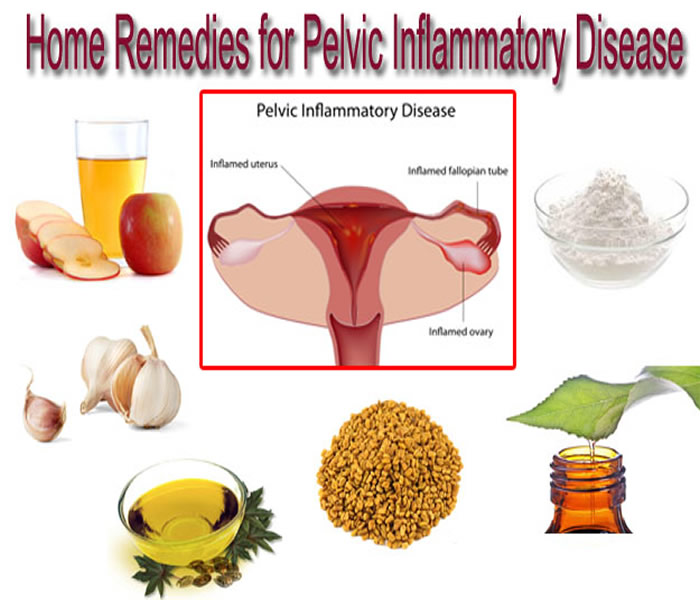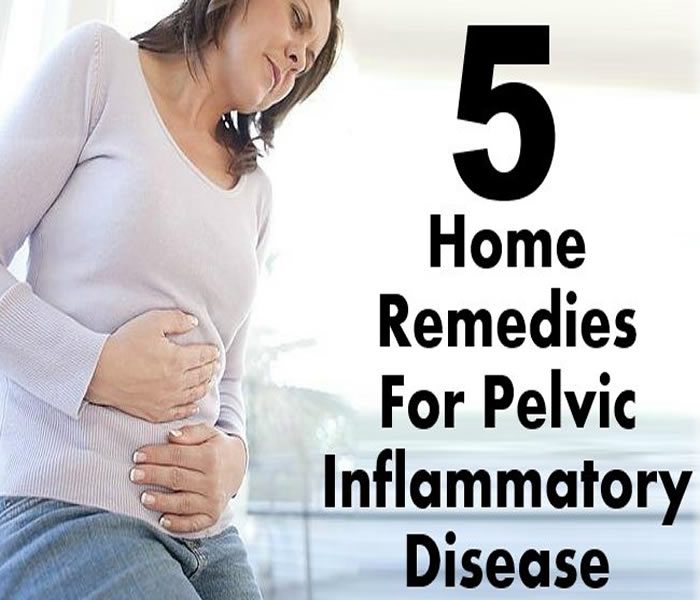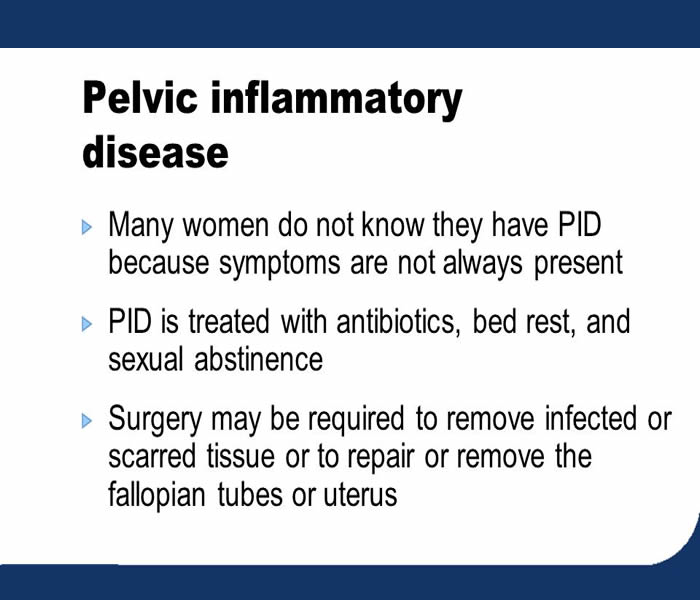Pelvic Inflammatory Disease(PID)
What Is Pelvic Inflammatory Disease (PID)?
PID is an inflammation of the female genital tract, accompanied by fever and lower abdominal pain.
It is an infection of a woman’s reproductive organs. It is a complication often caused by some STDs, like chlamydia and gonorrhea.

Causes of Pelvic Inflammatory Disease (PID)
PID is caused by bacteria from chlamydia and gonorrhea. These are sexually transmitted Diseases (STD). Having unprotected sex with someone who has already contacted STD can cause PID.
Pelvic inflammatory disease (PID) is an infection caused by bacteria. When bacteria from the vagina or cervix travel to your womb, fallopian tubes, or ovaries they can cause an infection.
PID is caused by bacteria from chlamydia and gonorrhea.
How do I get PID?
Bacteria can enter your body through Abortion
If you have an STD and do not treat it
If you have Miscarriage
If you have more than one sex partner or your sex partner has multiple sex partners.
If you do douch i.e. washing out the vagina with a mixture of water and vinegar
You can also contacted STD during Childbirth
Symptoms/Signs of Pelvic Inflammatory Disease (PID)
Some of signs of Pelvic inflammatory Disease include:
- Abnormal vaginal discharge that is yellow or green in color or that has an unusual odor.
- Bleeding after intercourse
- Chills or high fever
- Dull pain or tenderness in the stomach or lower abdominal area, or pain in the right upper abdomen
- Frequent urination
- Loss of appetite
- Nausea
- Painful urination
- Period cramps that hurt more than usual or last longer than usual
- Skipping your period
- Vomiting
How to diagnose Pelvic Inflammatory Disease (PID)
Your doctor would do pelvic physical examination to look for:
- Bleeding from your cervix.
- Fluid coming out of your cervix.
- Pain when your cervix is touched.
- Tenderness in your uterus, tubes, or ovaries.

Then He will ask you to do these:
- Blood tests
- Tests of vaginal and cervical secretions
- Endometrial biopsy: During this procedure, your doctor removes a small piece of your uterine lining (endometrium) for testing.
- Laparoscopy: is an instrument is inserted through a small cut in the navel in order to look at the reproductive organs.
How to Prevent Pelvic Inflammatory Disease (PID) Avoid douching
- Avoid having intercourse or putting anything such as tampons in your vagina for :
- 3 weeks following a miscarriage
- 3 weeks following an abortion
- 6 weeks following childbirth
- Get prompt treatment for any sexually transmitted disease
- Have regular pelvic exams
- If you're sexually active, get tested once in six months for STDs
- If you must have sex, Practice safe sex by limiting your number of partners to one
- Pay attention to hygiene habit
- Wearing a condom during intercourse helps prevent the STDs
Treatment for Pelvic Inflammatory Disease (PID)
Antibiotics: The initial treatment for mild cases of PID usually consists of one or more antibiotic medications taken by mouth. In a severe case you will be treated with a combination of intravenous and oral antibiotics. You may need to be hospitalized to receive medication intravenously (directly into a vein). Otherwise, the infection will likely reoccur when you have sex again.
Treatment for your partner: It is also very important that you and your partner both finish your treatment before having any kind of sex so that you don’t re-infect each other.
Temporary abstinence: Avoid sexual intercourse until treatment is completed and tests indicate that the infection has cleared in all partners.
Surgery: In more developed cases of PID, surgery may be needed to repair or remove reproductive organs.

If you are being treated for PID
You need to:
- Do not douche or use tampons
- Drink lots of fluids
- Eat a healthy diet
- Put a heating pad on your stomach
- Take good care of yourself
- You need bed rest for days to treat a serious infection
- You may take aspirin, ibuprofen to relieved pain
Pelvic Inflammatory Disease (PID) Home Remedies/Home Cure
Note: Do consult your doctor for proper diagnosis and treatment of this condition. Use home remedies only as an adjunct treatment.
Baking Soda
The alkaline environment in the intestines will not allow the microbes to grow. Baking soda effectively alkalizes the colon and helps in eliminating the infection in pelvis as well as in the other organs of the body. Baking soda has to be dissolved in water and taken every day to see better results.
Garlic
Garlic has strong antibacterial and antibiotic properties and it even regulates the good vaginal bacteria. Mince a few fresh garlic cloves to produce garlic oil. Apply some of this oil to a clean cotton swab. Insert the swab into the vagina and swab the inner walls. Let the oil absorb into the mucous membranes of the vagina for a few hours before washing. Repeat daily until the vaginal infection gets better. The main downsides to this treatment are the garlic odor and the potential to feel some intense tingling for a few minutes.
Bath/ warm Epsom salt Bath
A contrast warm Epsom salt is an effective remedy to reduce the symptoms of PID. While the hot bath will help relax the pelvic muscles, the cold bath will help alleviate pain.
Fill two large bathtubs– one with warm water and the other with cold water.
Add a few drops of lavender essential oil to each and stir well.
Add Epsom salt
First, sit in the tub with hot water up to your waist for 3 minutes.
Next, sit in the tub of cold water up to your waist for 1 minute.
Repeat a few times and end the session with cold water.
Enjoy a warm Epsom salt bath a few times each week.
Turmeric
Turmeric contains an active ingredient called curcumin with powerful antibacterial as well as anti-inflammatory properties that can help fight the infection as well as relieve symptoms. In addition, turmeric is good for your immune system.

How to do it
Boil 1 teaspoon of turmeric powder in a glass of milk. Drink it once daily until the symptoms subside.
Take turmeric supplements, 500 mg 3 times per day. However, consult your doctor before taking a supplement.
Yoghurt
A small cup of yoghurt consists of numerous Lactobacillus acidophilus bacteria that are considered as good bacteria. The bacterium that causes PID is Gardnerella vaginalis. Lactobacillus is found to be poisonous to the Gardnerella. So, one cup of yoghurt is applied in the vagina and left for three hours. It is washed off later and the process can be repeated for about three days to see better results.
Complications of Pelvic Inflammatory Disease (PID)
Abscesses
An abscess, also known as tubo-ovarian abscess (involves a fallopian tube and ovary), is a collection of infectious pus. If the abscess ruptures, the infection may spread to the peritoneum (lining of the abdomen) and cause peritonitis. Peritonitis is a medical emergency that often requires surgery.
Fortunately, most women seek early medical care because of pain associated with acute PID. Also, advances in diagnosis and treatment have lowered mortality rates for PID peritonitis dramatically. Mortality rates for peritonitis are about 5-6 percent.
Chronic pelvic pain: pain in the lower abdomen caused by scarring of the fallopian tubes and other pelvic organs
Ectopic pregnancy: PID is a major cause of tubal (ectopic) pregnancy. In an ectopic pregnancy, the fertilized egg can't make its way through the fallopian tube to implant in the uterus. Ectopic pregnancies can cause massive, life-threatening bleeding and require emergency surgery.
When there is a recurrence of PID, the likelihood of infertility increases with each subsequent episode.
Some complications, such as an ovarian abscess or Fallopian tube blockage, may require surgery.
Infertility
As well as increasing your risk of having an ectopic pregnancy, scarring or abscesses in the fallopian tubes can make it difficult for you to get pregnant if eggs can't pass easily into the womb.
It's estimated that about 1 in 10 women with PID becomes infertile as a result of the condition, with the highest risk for women who had delayed treatment or repeated episodes of PID.
However, a long-term study in the US showed that women who had been successfully treated for PID had the same pregnancy rates as the rest of the population. Blocked or damaged fallopian tubes can sometimes be treated with surgery. If this isn't possible and you want to have children, you may want to consider an assisted conception technique such as in vitro fertilisation (IVF).
Natural therapy for PID/UTI




